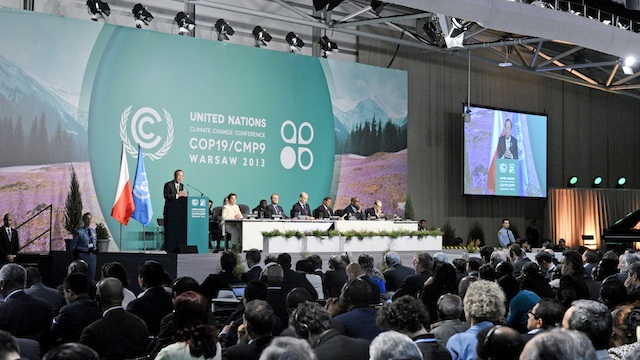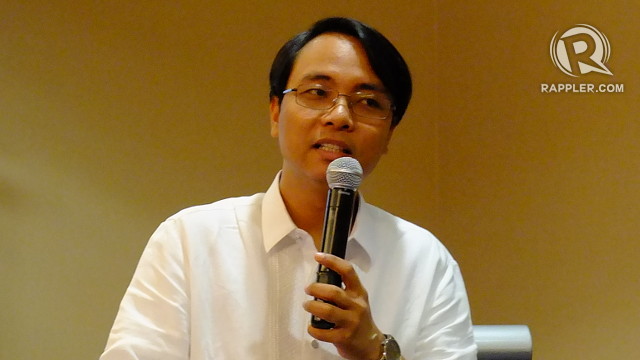SUMMARY
This is AI generated summarization, which may have errors. For context, always refer to the full article.
MANILA, Philippines – If you are to base the outcome of the Warsaw UN climate change conference on the daunting reality of climate change politics, the Philippines and developing countries got more than expected.
But if you measure it against what the world needs to curb global warming, the conference was a dismal failure.
This is how Climate Change Commissioner Naderev “Yeb” Saño assessed the recently concluded Conference of Parties 19 (CoP 19).
Held from November 11 to 23, the conference gathered world leaders and civil society organizations to make decisions on climate change issues, like the reduction of greenhouse gas emissions (GHG) which cause global warming, climate finance, and the damage incurred by countries especially vulnerable to climate change impacts – disasterous typhoons, drought, heatwaves, storm surges.
This is the 19th conference of its kind. It paves the way for new emission reduction targets in 2015. The ultimate goal of these conferences is to stabilize the concentration of greenhouse gases in the atmosphere so that the global temperature does not rise by more than 4 degrees Celsius – a temperature deemed “catastrophic” by scientists.
Saño, whose emotional speech as Philippine negotiator opened the conference, said the Philippine delegation wanted 3 things from CoP 19. He weighs in on each of them:
1. Absolute clarity on the finance commitments of the rich countries
Background: In 2001, developed countries committed to jointly mobilize US$100 billion by 2020 for the Adaptation Fund, a fund meant to help developing countries adapt to climate change and reduce their GHG emissions. The assistance should include technology transfer and capacity building.
“The situation when we went to Warsaw is that it was very unclear what will happen in 2020,” said Saño.
“There is no regular and stable flow of financial and technical resources and capacity-building until 2020. That’s disastrous for us. That’s a greater tragedy because that means delaying action. We want to help in mitigation by investing in renewable energy, but we can’t do that without financial support and technology transfer.”
Warsaw outcome: “Wala tayong nakita (We didn’t see anything). We were asking developed countries if they will provide $70 billion by 2016 as a mid-term target. We didn’t get that.”
Instead, the developed countries said they will mobilize at least $10 billion a year for the fund.
“We did not get the necessary scale we were asking for. However, it provides us with a good basis to move forward.”
Some concrete pledges were made during the Warsaw conference, putting $100 million in the Adaptation Fund, which Saño says the Philippines can tap for adaptation measures.
But the amount is measly compared to the original commitment. “What’s $100 million for many countries that need these resources? It’s really a drop in the bucket. It was a dismal failure.”

2. Operationalize the loss-and-damage mechanism
Background: The 3rd wave of climate change is when countries can no longer adapt because the losses from climate change impacts like typhoons, droughts, and storm surges are just too overwhelming. Vulnerable countries – most of them poor – have been calling for a mechanism to address loss and damage.
The mechanism assesses the losses and provides financial support, expertise and technology so the countries can rise from the devastation.
Warsaw outcome: “We fought the hardest in this area. This is why the conference reached Saturday evening when it should have closed on Friday evening.”
The Philippine delegation was fighting for the “absolute separation” of the loss-and-damage mechanism from the adaptation measures in the convention.
They asserted that loss and damage and adaptation are two very different things. A loss-and-damage mechanism is necessary precisely because poor countries can no longer adapt.
But the United States and Australia tried to block the mechanism. They instead wanted the mechanism to be put under the adaptation framework. Saño called the move “a trap.” (READ: US owes us climate debt – PH environmentalists)
“We all know that since the adaptation framework was adopted in 2010, no resources have flowed there,” said Saño. “It’s a virtually dysfunctional framework. That’s why we’re insisting it should be separate.”
But in the end, the Philippines had to bend back. The loss-and-damage mechanism ended up inside the adaptation framework. The delegation let this pass on the condition that, in 3 years, the mechanism will be reviewed and will thus have a new chance to stand on its own.
Despite the compromise, the Warsaw International Mechanism on Loss and Damage is a milestone in the history of the climate convention, Saño said.
3. For developed countries to announce ambitious emission reduction targets
Background: The Kyoto Protocol, a legally-binding commitment of developed countries to reduce GHG emissions by specific percentages, is virtually dead. Canada was the first to back out from KP, followed by the US. Instead, developed countries voluntarily pledged lower percentages of GHG reductions. These pledges are still not enough to ensure temperatures do not rise by 4 degrees Celsius.
Warsaw Outcome: “It was not only disappointing but miserably disappointing,” lamented Saño.
Instead of committing to bigger reduction in emissions, 3 countries decreased their targets. Japan, Australia, and Canada backtracked on their pledges. Japan explained that closing down its nuclear plants – which before the Fukushima earthquake supplied up to 29% of their power – have made them more dependent on fossil fuel energy. Combustion of fossil fuel to make energy is the leading source of GHG emissions.
“That was really a big blow to the confidence of the process,” said Saño about the backtracking.
The next conference, CoP 20, will be held in Lima, Peru, in 2014. By CoP 21 in Paris, new and hopefully more ambitious emissions reduction targets will be made and eventually met. The survival of the Philippines depends on this, said Saño.
If global temperatures rise above 4 degrees Celsius, storms of unimaginable power are sure to come our way. (READ: #COP19: Negotiating on who is to live and who is to die?)
That’s why climate change is also a social justice issue, he added.
Poor countries who have no resources to adapt are the countries who suffer the most from climate change. Super Typhoon Yolanda (Haiyan) smashed into the Philippines only 3 days before the start of the conference. – Rappler.com
Add a comment
How does this make you feel?






There are no comments yet. Add your comment to start the conversation.